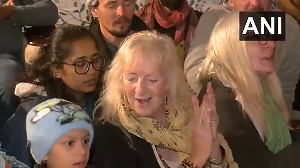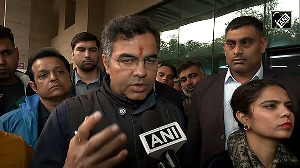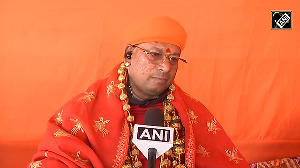As the 2G scam reverberates, shocking revelations have emerged of another related scandal involving collusion between big corporate houses, political parties and the media in influencing key policy decisions and ministerial appointments.
Outlook and Open magazines have reproduced partial transcripts of telephone conversations between Niira Radia, a corporate lobbyist for the Tata and Mukesh Ambani groups, and several top journalists, industrialists and politicians, which show journalists playing political roles well beyond the legitimate bounds of their profession.
The conversations, wire-tapped by the Income Tax department on a tip-off by the Central Board of Direct Taxes, are part of the official record in the 2G case before the Supreme Court -- and hence in the public domain. They are widely available in audio transcript format on the Internet.
Although their veracity isn't forensically established, they prima facie appear authentic. Most of those who have been taped haven't denied they are genuine.
The 104 conversations, from which the transcripts are drawn, are not even 2 percent of the 5,851 calls tapped from Radia's phone now being analysed by official agencies. They contain the most damaging evidence ever to have emerged of gross violations of ethics and political propriety by influential journalists.
The conversations show that Radia, with her formidable networking skills and influence, tried to recruit Hindustan Times's Vir Sanghvi and NDTV's Barkha Dutt, among others, as mediators who would influence the distribution of key portfolios during the formation of the United Progressive Alliance ministry in mid-2009. One of their main objectives was to ensure that the now-disgraced A Raja would be given the telecommunications portfolio.
A second issue was the June 2009 Bombay high court judgment on the dispute between the Ambani brothers over the pricing of natural gas from the Krishna-Godavari Basin. Here too, Radia coaxed or subtly pressured journalists to support Mukesh Ambani's view. Sanghvi, in particular, wrote a column in the Hindustan Times, relying heavily on Radia, and going by two conversations, virtually eating out of her hand.
Both the 2G and the Radia tapes scandals show that India's precious public resources, belonging to the national commons, are being undersold or plundered through manipulation by venal businessmen and corrupt politicians, often with journalists' help.
The two scams haven't fused in public discourse. But that's because most of the media has blacked out the story despite the claim that the Fourth Estate is a guardian of the truth and a watchdog of democracy. The scandals are eating away into the legitimacy of the system of governance.
The underselling of licences in the 2G scam has caused the public exchequer a loss of between Rs 66,000 crore (Rs 660 billion) and Rs 1.77 lakh crore (Rs 1,770 billion), according to the Comptroller and Auditor General.
The scandals of the past two decades pale beside this, including the two stock market scams (1992 and 2001), the coffins scandal (1999), the Sukh Ram scandal (1996), the defence kickbacks exposed by Tehelka (2001), and numerous Special Economic Zone-driven land grabs since then. Bofors, which involved bribes of Rs 64 crore (Rs 640 million), looks like a lark.
The mind-boggling Rs 1.77 lakh crore loss to the public equals more than four times the budget of the United Progressive Alliance's flagship social programme, the National Rural Employment Guarantee Act. Raja used four devices or methods to inflict it.
First, he priced the spectrum licences at a ridiculously low Rs 1,651 crore (Rs 165.1 million) each. Some were resold at Rs 12,000 crore (Rs 1.2 billion) within a few weeks.
Second, the deadlines for the receipt of applications were changed to favour certain business houses -- in violation of the conditions.
Third, some industrialists were allowed to conceal their equity holdings in different telecom companies, thus violating the guideline that nobody can hold more than a 10 percent stake in two telecom service providers in the same circle. Among the companies here was Anil Ambani's Reliance Communications which held a big chunk in Swan Telecom.
Fourth, the licensees were to roll out 10 percent of their networks within a year and all of it within three years. This wasn't done.
The Department of Telecommunications should have levied penalties of up to Rs 20 lakh (Rs 2 million) a week for delays exceeding 26 weeks, or cancelled the licences. This wasn't done. Among the reported beneficiaries were Tata Teleservices, Unitech, Datacom/Videocon and Loop Telecom.
Finally, DoT gave away spectrum worth Rs 37,000 crore (Rs 3.7 billion) free to several companies, including BSNL and MTNL. It is one thing to argue that the public companies should be compensated for subsidising rural telephony. It is another to give them free spectrum without transparency.
In the private operators' case, this was a way of facilitating outright plunder.
At the root of the scandal lie not just corruption, violations of DoT's licensing conditions and regulatory failures, but a deeply flawed telecom policy formulated in 1999, and since carried over. This policy allowed blatantly partisan decisions, including most importantly, allotting spectrum on a first-come-first-served basis.
This makes no sense in a precious scarce resource like the electromagnetic spectrum, whose economic value is unknown. Its price was arbitrarily fixed in 2001, when mobile telephony was at a nascent stage.
Auctioning spectrum would have been far better, if accompanied by conditions containing larger social objectives -- including access for the rural and underprivileged population, affordable services, healthy competition and prevention of cartels. But the telecom policy has encouraged cartelisation against the interest of consumers and balanced telecom development.
This makes it imperative that the parliamentary investigation of the 2G scam cover the telecom policy too. This is essential if past malpractices are to be probed, including permission given under the National Democratic Alliance rule to Reliance to migrate from a wireless-in-local-loop licence to mobile telephony, and the extension of CDMA licences for the Tatas and Reliance to GSM services. Parliamentary committees must go into policy issues if they are to keep a check on the government.
However, what of the media's role in the 2G and gas allocation episodes, disclosed in the Radia tapes?
Several issues arise here, including the limits of the legitimate relationship between the journalist and his/her source; the intrusive role of lobbyists who block or grant access to industrial magnates and trade it with favours; the integrity of journalists who have become political fixers, and of course, the State's violation of privacy without a proper legal rationale, which must be strongly resisted.
Journalists often have to engage their sources thus and exchange information that's not strictly limited to the primary subject in which they are interested.
What is not legitimate and definitely against journalistic ethics is to use access to and influence with powerful politicians to fix ministerial berths and other positions for individuals in ways calculated to help the companies that employ the lobbyist-source.
It is one thing to pump and cajole sources, including lobbyists, for information that's professionally relevant. It is quite another to agree to do favours for the lobbyist and his/her company, where what matters is not information, analysis or interpretation, but political influence.
It is not legitimate for journalists to use their access to people in authority in this way, or agree to write articles on lobbyists' dictates and get them vetted by them ('run it by you').
Sometimes, journalists use the information they get from one source to extract more dope from, say, their competitors, or get help from other sources to analyse it. But there they must draw the line.
The self-justification offered by Sanghvi and Dutt is unconvincing. The claim that NDTV has carried anti-Raja stories doesn't validate Dutt's offer to lobby Congress leaders on Radia's behalf. Nor will Sanghvi's excuse wash, that he was only 'stringing' Radia.
The crossing of lines has dangerous implications for the credibility of the media -- its greatest asset. Already, many journalists have strayed from the profession's proper boundaries.
Some have become advisers, strategists and publicists for corporations. Some serve as 'food consultants' to five star hotels. Many enjoy free perks from airlines, hotels and spas. That's bad enough.
It would be even worse, and ethically more repugnant, if journalists become political fixers or take instructions from corporate lobbyists.
The Radia tapes suggest that that is precisely what happened. Journalism has reached a new moral-professional low in India. That's tragic for democracy.
ALSO READ (external links): Barkha Dutt on the allegations against her
Vir Sanghvi: Setting the record straight
From Outlook: The Radia tapes






 © 2025
© 2025